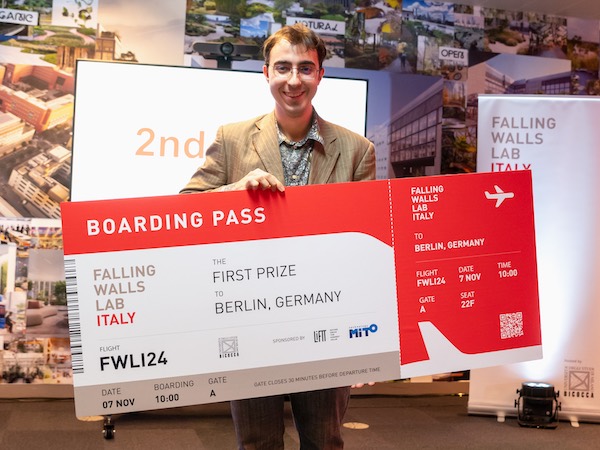For the second consecutive year, a student from Ca' Foscari University has won an award at the Falling Walls Lab Italy competition, which celebrates the innovative ideas of younger generations. Leone Bacciu, a Bachelor’s degree student in Computer Science, is among the two international competition winners this year.
On May 30th, inventors, students, professors, and researchers gathered in Milan to present their groundbreaking proposals and answer the question, “Which wall will your research break in science and society?” before a jury of experts. The event also featured Giancarmelo Stamilla, a Ca' Foscari PhD student and winner of the FWLab Italy 2023.
The competition, hosted and promoted for the sixth year by the University of Milan-Bicocca, is in partnership with several prestigious institutions, including the University of Milan, Bocconi University, University of Bergamo, University of Pavia, PoliHub, Polytechnic University of Bari, Ca' Foscari University of Venice, Catholic University of Milan, Social Innovation Teams, BiM, Netval, University for Innovation Foundation, and the Italian Embassy in Berlin. It is sponsored by Liftt and MITO Technology. The collaboration between Ca' Foscari and Bicocca was facilitated by the staff of PInK, the Office for the Promotion of Innovation and Know-how, which also supported Ca' Foscari candidates in preparing their presentations.
Leone's pitch, "Breaking the Wall of Black Boxes in Medicine," presented the pyFUME project in just three minutes. PyFUME is a tool designed to aid medical decision-making through interpretable artificial intelligence communicating in human language.
Guided by Professor Marco Salvatore Nobile, the Rector’s Delegate for Digital Innovation in Research and professor of the Department of Environmental Sciences, Informatics, and Statistics, the international project involves the University of Milan-Bicocca and the Dutch institutions Jheronimus Academy of Data Science (JADS) in ‘s-Hertogenbosch and Eindhoven University of Technology (TU/e).
Conventional AI algorithms often rely on "black-box" machine learning models that make decisions and predictions which are not easily understandable. Although effective, this approach is not suitable for high-risk fields such as medicine, where users have the right to receive an explanation of decisions that could affect their health, as highlighted in the upcoming AI Act by the European Commission. According to Leone Bacciu, traditional machine learning methods like those used in ChatGPT or Google Lens are inherently inscrutable. Even if a programmer were to analyse the model, they wouldn't fully understand its operation. PyFUME addresses this issue by creating models that, using tabular inputs, not only generate predictions or classifications but also provide explanations on how the results were achieved. This enables doctors to make more informed and timely decisions, ensuring that patients have the right to understand the reasoning behind their treatment choices.
Bacciu got involved with the pyFUME project after completing Professor Nobile's Computational Intelligence course, which was a new elective in the Computer Science degree program. "I expressed interest in collaborating on the tool and worked on a problem related to categorical variables, which are data that take on discrete values within a limited set, such as gender or blood type, rather than a continuous range like body temperature." In July, Bacciu will present his work at the IPMU (Information Processing and Management of Uncertainty in Knowledge-Based Systems) conference in Lisbon, Portugal.
PyFUME's approach relies on Fuzzy Logic, an essential concept that Bacciu clarified for us. "Programs typically operate on Boolean logic, where variables are either true or false. However, to address problems that require more precise details, we need to express slightly more vague concepts. For instance, in medicine, when determining whether a patient has a particular illness, we can't validate only body temperatures above 38°C, as that would exclude those with 37.9°C. Fuzzy logic allows us to write and program logical processes by 'smoothing out' truth values, yielding degrees of satisfaction for certain rules rather than simply true or false outcomes."
Leone, as the winner of the Italian Falling Walls Lab, will travel to Berlin in November to present his pitch at the global finals of the competition. He will compete with 100 other ideas from over 60 countries for the ‘Breakthrough Winner’ title in the emerging talents category.










